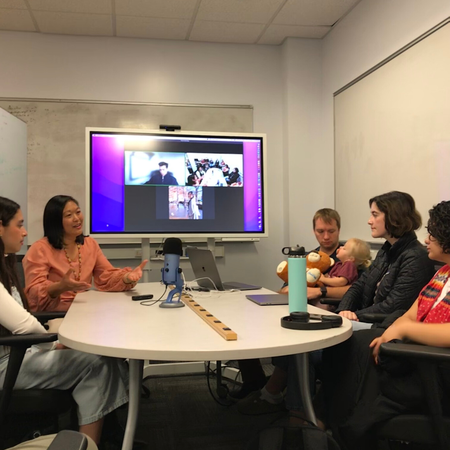Neurodiversity & Social Media Research with Dr. Xinru Page
December 02, 2022

Dr. Xinru Page is a member of the Computer Science faculty and has been here at BYU for the last three years. Prior to joining the university, she taught at Bentley University. Dr. Page holds a Ph.D. in Information and Computer Science with a concentration in Informatics from the University of California, Irvine, and B.S. and M.S. degrees in Computer Science with a specialization in Human-Computer Interaction from Stanford University. She directs the Social Technology and Privacy Lab on campus which conducts research on human computer interaction.
Dr. Page has several students who work as researchers in the lab, and they are on various teams that do research in the realm of social technology and privacy. Some of those teams include Human-Algorithm Interaction, Technology Adoption and Nonuse, and Understanding Individual, Developmental, and Cultural Differences in Privacy Attitudes. Lab meetings are held every Thursday, and the teams meet together with Dr. Page to get feedback on the results of current studies, discuss issues and opportunities posed by new technologies, and even practice giving presentations. Lab meetings begin with a prayer and a spiritual thought, as is customary at BYU. Dr. Page explains that she enjoys doing this because everything is connected, both religion and research, and keeping them integrated in her life makes things "feel whole."
One main study that Dr. Page has recently published a paper on identifies the unintended negative consequences when young autistic adults interact on social media. Social media is a technology that has connected the world and provided opportunities for innovation and maintaining relationships, but for those who view and navigate the world differently, it has the potential to mislead users and lead to dangerous situations. Autism is a form of neurodiversity, and those on the Autism Spectrum have communication, social, and behavioral differences, which carry over to interactions online. There has been very little prior research on this subject.
In Dr. Page’s research, she and her team performed a lot of ethnographic fieldwork. This included interviews with autistic youth and their parents, as well as social service providers who interacted with those on the autism spectrum. They also participated in and observed workshops on social media as well as life skills in general. They focused on understanding how autistic young adults utilized the main affordances of social media, namely, sharing user-generated content, consuming user-generated content, connecting with others, and networked interactions. The research sought to understand how these autistic young adults used these affordances, what the consequences of this use were, and what could be done to redesign a more accessible system.
One observation made in her research was that a large reason for Autistic users to perceive affordances differently was the literal interpretation of the interface. This leads these users to view and share media differently. For example, some neurodivergent individuals would disclose personal information, like a phone number or email address, just because there were fields that asked for this information (even though a neurotypical interpretation would recognize these as optional fields). Another way this is harmful is when a literal interpretation is applied to prompts and labels found on social media. Facebook typically asks users to share 'what’s on their mind,' and this can lead to some oversharing feelings or publicly expressing dislike for someone or something. One staff member interviewed shared this: "They’re going onto Facebook at night and, ‘I hate my job,’ and, ‘I hate this person.’" For these neurodivergent individuals, they were doing what they thought was appropriate by following the platform's instructions. However, interpreting and following prompts literally often proved harmful to their relationships and personal safety.
One especially problematic issue was the label of ‘friend’ on social media. Rather than understanding this as a way to connect with people you already know, it was taken as an invitation to become a friend, and some of these individuals assumed a deeper relationship with this ‘friend’ than they actually had in reality. One participant shared, "I thought I was her friend, but she said, ‘You’re not because we don’t know each other well enough.’"
Dr. Page and her students have also been working to find effective ways to change the design of social media and online technologies to be more inclusive of this population. They determined that prompts and labels need to be more direct, with less ambiguity and safety in mind, and that more social guidance needs to be provided to these neurodivergent individuals. Kirsten Chapman, a student working with Dr. Page, shared that one project in this inclusive design she had worked on was adding a questionnaire to the friend request feature of social media. Questions would be asked to help neurodivergent individuals determine whether they actually knew the person and if it made sense to add them as a connection online.
Check out the News tab to see other cool stories!
To read more about the research and design being done by Dr. Page and her team, please visit one of the links below!

